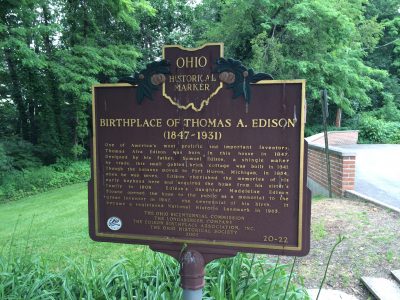“There’s a way to do it better — find it.” — Thomas A. Edison

Sunday, February 11th marks the 171st birthday of Thomas Alva Edison. And, since I consider myself to be a bit of an Edison aficionado – often getting swept away in the many interesting books and documentaries chronicling his life – I thought this would be an interesting time to look at how his background relates to the modern day Research & Development tax credit.
First off, let me say that I don’t believe any other inventor has done more to foster innovation in his time than Thomas Edison. With over 1,000 patents to his name, the Ohio-born technology pioneer brought forth some of the greatest inventions of our time. (Side note – Born in the small town of Milan, Edison’s birth home sits approximately 45 minutes west of my hometown of Cleveland. Late last fall, I finally had the opportunity to tour it along with the accompanying Edison birthplace museum. The included photos are from my visit.) 
Secondly, I understand that you may find the title of this blog ridiculous on its face. Of course Edison’s work would have qualified for an R&D tax credit if it had existed – we’re talking about the inventor of the incandescent light bulb and phonograph. And you’re right, in the sense that you won’t find too many people in the modern world who would argue against the innovative nature of Edison’s work. With the benefit of hindsight, these immense technological contributions – from actually inventing the light bulb, to figuring out ways to produce it faster and cheaper – are easy to recognize as textbook research and development.
But, what if I told you that Thomas Edison received almost no formal education, and in fact had little formal schooling at all. That’s right – one of the greatest innovators of the modern era was essentially self-taught.
I doubt you’d argue that his lack of formal education made him any less capable of conducting research and development. In fact, you’d probably label that idea downright silly. And yet, many times over the course of my 30+ year career, I’ve heard exactly this same argument – that the time and effort of certain individuals can’t qualify for the R&D credit because they lack a formal education in a technical field.
You see, in the line of work that I do, I’ve encountered no shortage of great inventors. And some – like Edison, have had brilliant minds but have lacked advanced degrees. More than once, I’ve found myself defending the efforts of these individuals, often company presidents or founders, who were clearly the brains behind their company’s big idea, but faced scrutiny and skepticism simply because they weren’t a text book “scientist or engineer.”
When faced with such a ludicrous idea, I always find it helpful to go back to Edison.
Think about it. Using this logic, neither he, nor many of his Menlo Park innovations would have qualified for the modern R&D credit, simply because the man behind them didn’t go to college.
That would be absurd, which is why there is not, nor has there ever been an educational requirement noted under IRC Sec. 41. It’s all about the activity, not the formal educational resume of the person performing that activity. What the code actually requires is that the individuals claiming the credit be directly involved with, directly supervising or directly supporting qualifying R&D efforts.
So back to the original question at hand – would Thomas Edison’s efforts have qualified for today’s R&D tax credit? Of course – as do the efforts of many modern innovators who lack the same academic accolades as so many of their peers. Moreover, the U.S. Government has always recognized this truth, and designed the R&D tax credit accordingly.
